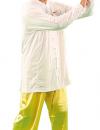Qi-Empowered Patient: Chinese Mind-Body Energetics in the Integrative Medical Setting
February 27, 2023
Remind your clients, that it is impossible to know when the natural results will arise and that patience and perseverance, in cultivation of wellbeing, is the recognized best practice for catalyzing the intended good result.”
The Ethics of Mind-Body Energetics
February 20, 2023
One of my favorite teachers, Master Zhu Hui from Tian Tai Mountain in eastern China told me, “A person who makes wise use of the Three Intentional Corrections a few times a day will resolve their pains, cure their diseases, and achieve longevity.”
Qigong Produces the Most Profound Medicine, Part 2
January 30, 2023
It is really very simple: people who prevent disease and who activate the inner medicine through self-initiated health enhancement practice need less clinical medicine, whether it is conventional allopathic or holistic.”
Qigong Produces the Most Profound Medicine, Part 1
January 23, 2023
“The most profound medicine is produced naturally -- in the human body – for free.” This phrase, from The Healer Within, is the innovative foundation of a profound peak performance and vitality system.
Meet the Author: Roger Jahnke, OMD talks with Gene Ching about writing and teaching Qigong and Tai Chi for decades (video)
July 26, 2022
Dr. Roger Jahnke talks with Gene Ching about his years of writing about Qigong and Tai Chi before they were widely known in the USA, studying in China, the formation of the NQA (National Qigong Association) and his new Healer Within: Medical Qigong video release with YMAA Publication Center.
Preparation for Beginning a Tai Chi Sequence
-
January 5, 2017
Before you begin the sequence it is good to stand in wuji for a moment to focus your intent and your qi.
Introduction of Yang Style Lao Liu Lu Taijiquan
-
August 8, 2016
In the time of Qing Dynasty, taijiquan was quite popular in the royal palace due to Prince Pu Lun Bei Zi, a man of great power and wealth, who appreciated the fighting technique of Yang-style taijiquan. He recognized the martial applications disguised in the slow, graceful movements, as if there were needles hidden, wrapped in cotton.
Taijiquan and Buddhadharma
-
May 30, 2016
The three dharma seals in Buddhadharma: impermanence, non-self, and nirvana. In the sutras it is said that whatever is phenomenal is impermanent, everything is of non-self, and nirvana is perfect tranquility.
Safety In Practicing Taijiquan
-
August 10, 2015
Is there a safety issue for practicing taijiquan? Yes. I occasionally listen to a program on learning taijiquan while in my car. A host once asked his guest (a famous master of taijiquan), "What physical conditions are required for learning taijiquan?" The guest answered: "You can learn taijiquan as long as your knees are fine."
On Practicing Taijiquan—The Five Mindsets
-
June 29, 2015
Many people are aware that taijiquan is beneficial, but to obtain those benefits one needs "samutpada" (arousal of earnest intention) and one has to pay the price. Everyone can afford it, but most people are reluctant to pay. Whenever I run into taijiquan enthusiasts who want to practice taijiquan with me, what I first say is, "If you want to learn taijiquan you need to pay the price.
Mind Approach in Practicing Taijiquan
-
June 22, 2015
The Mind Approach in Practicing Taijiquan. The mind approach is a way of practicing with one's heart (mind and intent) as the guidance. It used to have no fixed patterns or rules; however, the mind approach I present has its principle based on the following six points.










